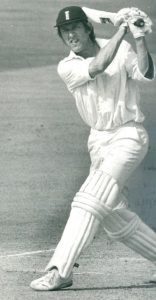Brian Luckhurst, the former England and Kent batsman, died on March 1, 2005, at the age of 66. Luckhurst, who was associated with Kent County Cricket Club for more than 50 years, ended up as their president. He had been suffering from cancer of the esophagus for some time.
Brian William Luckhurst’s international career started with five unofficial Tests against the Rest of the World XI in 1970. He made the first of 21 appearances for England against Australia on the Ashes tour of 1970–71. As Geoff Boycott’s opening partner, he marked the occasion with a lovely 74 in the first inning. Luckhurst debuted against Australia in 1970–71, scoring 455 runs at an average of 56.87.
He made this tour memorable by scoring two centuries and was named Wisden Cricketer of the Year in 1971. He made four centuries in 41 innings, including a top score of 131 against Australia in the second Test at Perth. Primarily, he was a dependable batsman who knew his limitations and stuck to them. Luckhurst was also a part-time left-arm spinner whose solitary international wicket was the notable scalp of Gundappa Viswanath. He was also an excellent all-around fielder. His fleet footedness against spin earned him a century apiece in India and Pakistan in 1971.
